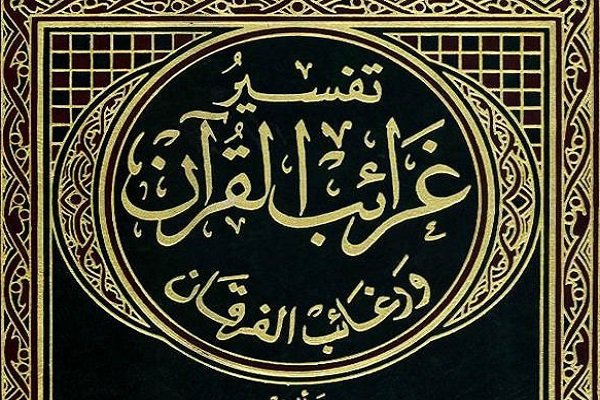An Exegesis Discussing Quran’s Verbal, Spiritual Secrets

Nizameddin Hassan ibn Muhammad Neyshaburi wrote the exegesis with a rational method and a guidance approach based on the verbal and spiritual teachings of the Holy Book.
It can be regarded as one of the best Quran interpretations that has created a meaningful link between the Quran’s verbal and spiritual secrets and its Zahir and Batin (exoteric aspect and esoteric aspect).
Who was Neyshaburi?
Nizameddin Hassan ibn Muhammad Neyshaburi (died after 1328 AD) was known as Nizam A’araj. He is among the Muslim world’s renowned memorizers. His family and tribe lived in Qom but he was born and grew up in Neyshabur (northeast Iran). Scholars who lived after him have highlighted his virtues, knowledge, competence and expertise. He was an expert in rational sciences and in Arabic language and literature.
He wrote many books like Awqaf al-Quran and Lubb al-Ta’wil. His main work is Gharaeb al-Quran and Ragheb al-Furqan.
Gharaeb al-Quran
Neyshaburi has used the Quran interpretation by Fakhr Razi and the Kashhaf by Zamakhshari in writing his Quran exegesis. He has mentioned their views and added many of his own points and views. Hadiths of the Holy Prophet (PBUH) and narrations from the Companions and Tabi’un (successor) have a special place in this book.
Neyshaburi has added many points to those mentioned by Fakhr Razi and Zamakhshari, completing and sometimes rejected their views. When there is a difference of opinion between Fakhr Razi and Zamakhshari, Neyshaburi offers his view on which of them he agrees with.
At the end of the Quran interpretation, Neyshaburi talks about what motivated him to write the work. He says he wrote it so that it would be his companion in life in this world and the next. Another motivation was to collect useful views and discussions in the field of Quran interpretation, including those about words and their meanings and functions.
On choosing Fakhr Razi’s interpretation as one of his sources, he writes that Fakhr Razi’s work includes useful and fruitful discussions and also some content that makes it difficult for the readers to benefit from it. That is why Neyshaburi decided to omit the difficult and not so useful content and offer the rest to the readers in a brief and clear format.
Interpretation Method
In this Quran exegesis, Neyshaburi has his own method. At the beginning of each Surah, he offers general information about the name of the chapter, its being Makki or Madani, and number of verses, words and letters. He then mentions different readings about each verse.
One of the features of this work is its classification of the contents in different ways into various topics and each topic into several issues.
The author of Rawzat al-Jannat has described Neyshaburi’s Quran exegesis as one of the best interpretations of the Holy Book that includes verbal and spiritual points and Zahir and Batin benefits.


